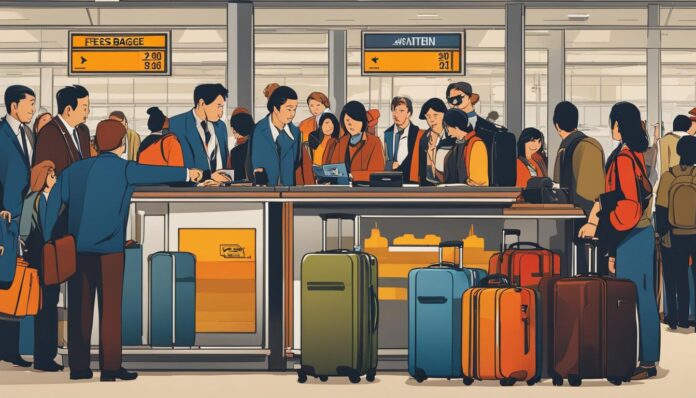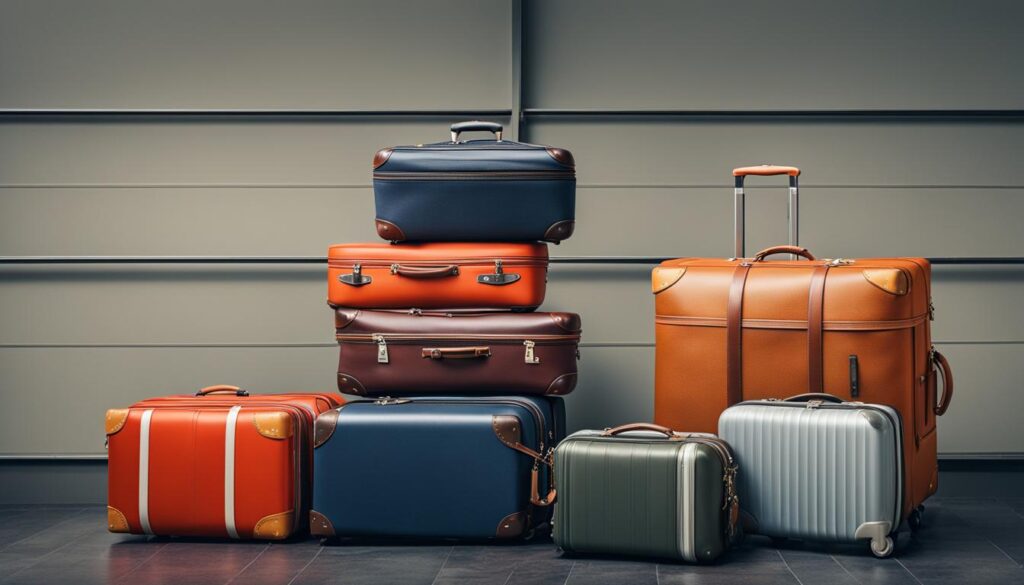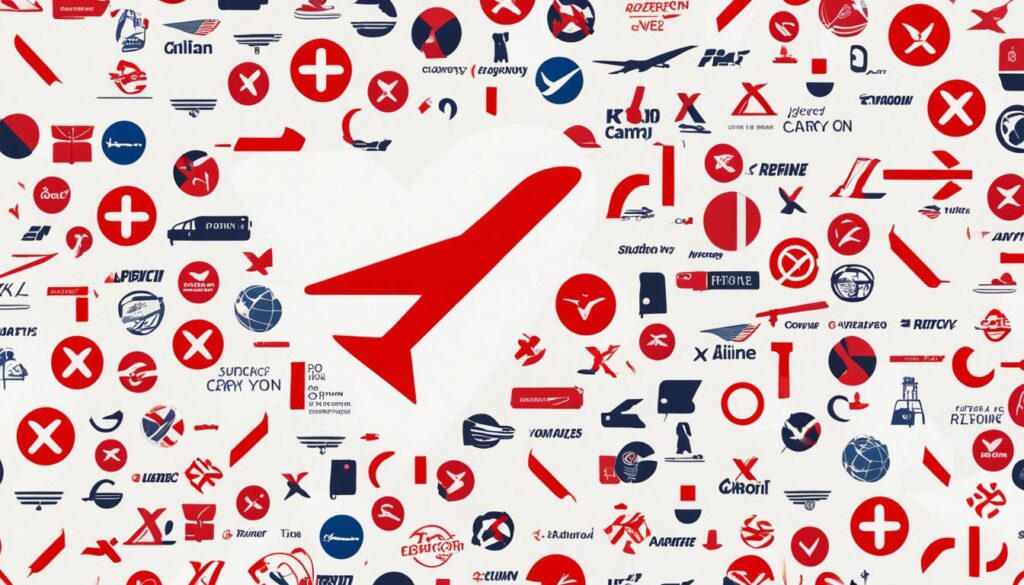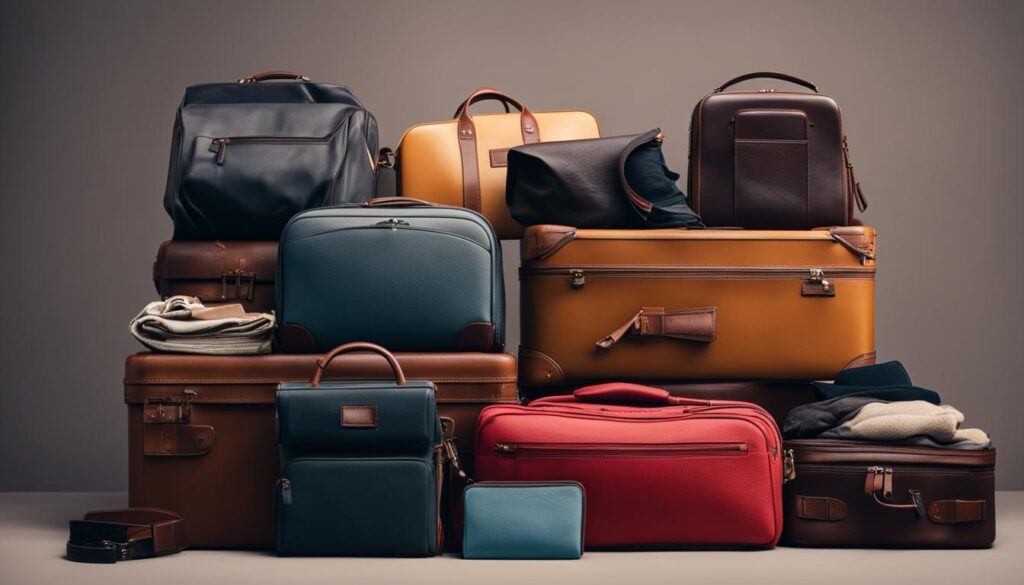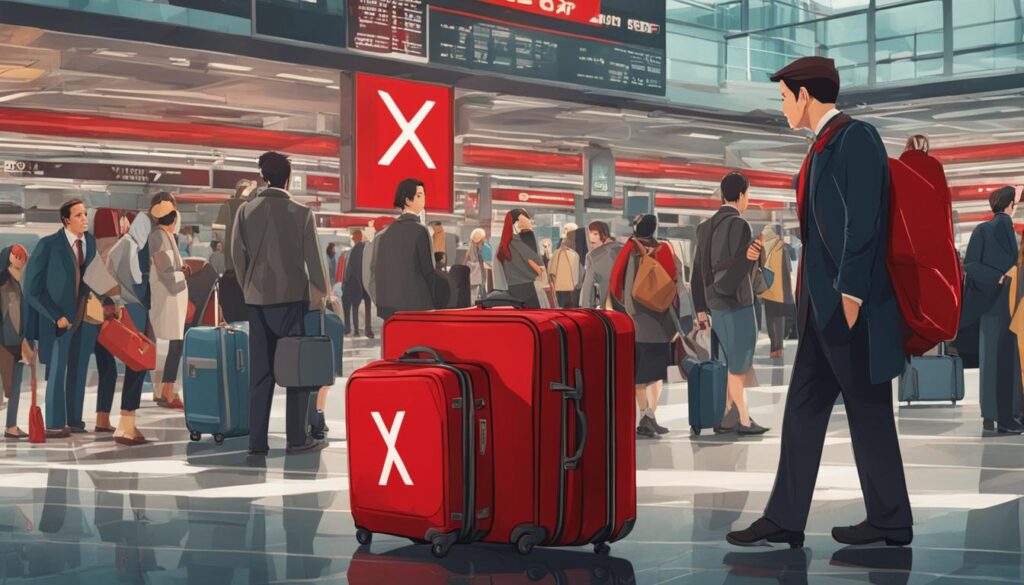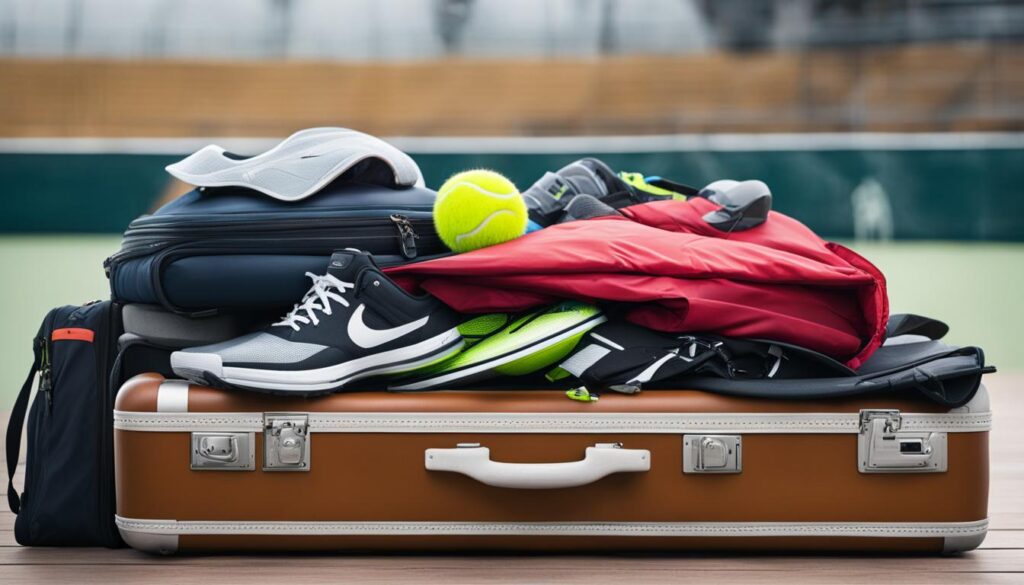Are you tired of getting blindsided by unexpected airline luggage fees? Understanding airline luggage policies is essential for a stress-free and cost-effective travel experience. In this article, we will guide you through how to navigate and understand airline luggage restrictions and fees, including baggage policies, weight limits, and more. We’ve got you covered, from carry-on restrictions to oversized baggage fees. Stick with us to avoid any unanticipated surprises at check-in and ensure that your travels are smooth sailing.
Understanding Airline Baggage Allowances
When preparing for your trip, it’s crucial to understand the baggage allowances of the airline you’re traveling with to avoid additional fees or complications. Airlines have varying baggage allowances, including weight limits for both carry-on and checked luggage.
Carry-on baggage generally has a weight limit of 7-10 kg (15-22 lb), while checked baggage can weigh between 23-32 kg (50-70 lb), depending on the airline and destination. However, it’s always best to check your airline’s website or contact their customer service for specific information.
| Airline | Carry-on Allowance | Checked Allowance |
|---|---|---|
| Delta | 1 personal item + 1 carry-on | 1st bag: $30, 2nd bag: $40 |
| United | 1 personal item + 1 carry-on | 1st bag: $35, 2nd bag: $45 |
| American Airlines | 1 personal item + 1 carry-on | 1st bag: $30-35, 2nd bag: $40-45 |
Remember to also familiarize yourself with any additional baggage fees or charges for overweight or oversized baggage. By understanding your airline’s baggage allowances, you can pack accordingly and avoid any surprises at the airport.
Carry-On Baggage Restrictions and Tips
When travelling by plane, understanding the carry-on restrictions and regulations is crucial to ensuring a hassle-free security screening process. Most airlines have specific guidelines for carry-on baggage, including size limitations and restrictions on prohibited items that are not allowed on board. Violating these regulations can result in fines, delays, or even denied boarding.
Make sure to review your airline’s baggage policies before packing your carry-on. Some of the most common prohibited items in carry-on luggage include:
- Sharp objects, such as scissors, razor blades, and knives
- Firearms and ammunition
- Liquid containers over 3.4 ounces (100 milliliters), unless stored in a clear, plastic bag
- Explosive or flammable materials, like aerosol cans or gasoline
Carry-On Baggage Size Restrictions
Carry-on size restrictions differ between airlines, so it’s important to check your airline’s website or contact their customer service to determine the maximum dimensions of your baggage. Some airlines also have weight restrictions or limits on the number of carry-on items allowed per passenger, so be sure to review these as well.
| Airline | Carry-On Size Restrictions | Weight Restrictions | Number of Items Allowed |
|---|---|---|---|
| Delta Airlines | 22 x 14 x 9 inches | No weight limit | 1 carry-on bag + 1 personal item |
| American Airlines | 22 x 14 x 9 inches | No weight limit | 1 carry-on bag + 1 personal item |
| United Airlines | 22 x 14 x 9 inches | No weight limit | 1 carry-on bag + 1 personal item |
Useful Tips for Hassle-Free Security Screening
Follow these useful tips to make the security screening process for your carry-on baggage smooth and hassle-free:
- Organize your items before approaching the security checkpoint, so that everything is easily accessible
- Remove your quart-sized bag of liquids and place it in the screening bin
- Remove any electronic devices larger than a cell phone and place them in the screening bin
- Remove your shoes and place them in the screening bin, if required by the airport or airline
- Follow the instructions of the TSA agents and be prepared to answer questions regarding your luggage
By understanding the carry-on restrictions and packing efficiently, you can reduce stress and enjoy a smoother travel experience. Remember, carry-on baggage is subject to inspection by TSA agents, so pack with care and consideration. Before your next flight, review your airline’s carry-on policies and make sure to comply with all carry-on baggage restrictions.
Checked Baggage Policies and Fees
Checked baggage policies and fees vary greatly among airlines, so it’s crucial to do your research and understand your specific carrier’s guidelines before heading to the airport.
Most airlines allow passengers to check at least one bag free of charge, but beyond that, fees typically apply. These fees can range anywhere from $25 to $100 or more, depending on the airline and the destination. Additionally, many airlines impose weight limits on checked bags, which can result in additional fees if your luggage exceeds the limit.
It’s important to note that overweight or oversized bags can come with steep fees. To avoid all of these extra charges, it’s best to pack smart and pack light. Consider investing in a luggage scale to ensure that your bags meet weight restrictions, and be mindful of any items that could cause your bags to exceed size limits.
Tips to Save Money on Checked Baggage Fees
- Opt for airlines that offer free checked baggage.
- Pack only what you need to avoid incurring overweight fees.
- Choose lightweight luggage to minimize additional weight charges.
- Take only one or two checked bags instead of multiple, if possible.
- Join the loyalty program of your preferred airline to access baggage discounts.
Checked Baggage Fee Comparison Table
| Airline | First Checked Bag Fee | Second Checked Bag Fee | Weight Limit |
|---|---|---|---|
| Delta Airlines | $30 | $40 | 50 lbs |
| American Airlines | $30 | $40-$150 | 50 lbs |
| United Airlines | $35 | $45 | 50 lbs |
| Southwest Airlines | Free | $75 | 50 lbs |
| JetBlue Airways | Free | $40-$150 | 50 lbs |
Remember to always double-check your airline’s policies and fees before your trip to avoid any unexpected costs at the airport.
Understanding Oversized Baggage Fees
Traveling with large or oversized items can be challenging. It’s important to understand airline baggage regulations to avoid any unexpected fees. Most airlines consider oversized baggage to be any item that exceeds the standard size limit of 62 inches (length + width + height). Oversized baggage fees can be hefty and can vary from airline to airline. These fees can range from $100 to $500 or even more, depending on the size, weight, and route of your flight. To avoid these fees, it’s essential to pack carefully and plan ahead.
If you’re traveling with oversized baggage, it’s best to check with your airline beforehand to understand their policies and fees. If possible, try to pack items in smaller bags or boxes to meet the airline’s weight and size requirements. Airlines may also have additional fees for overweight items, so make sure to weigh your baggage ahead of time and pack accordingly. If your oversized item is too large or heavy to meet the airline’s requirements, consider arranging for shipment through a freight or shipping company.
Keep in mind that some airlines have specific regulations for oversized items such as sports equipment or musical instruments. If you’re traveling with these types of items, it’s best to check with your airline for their policies and fees. Some airlines may allow these items as part of your standard baggage allowance, while others may charge additional fees or require special handling.
Tips for Handling Oversized Baggage
Here are some additional tips to keep in mind when traveling with oversized baggage:
- Always measure and weigh your baggage ahead of time to avoid any unexpected fees.
- Check with your airline for their policies and fees for oversized items.
- Consider shipping large or heavy items through a freight or shipping company.
- For sports equipment or musical instruments, check with your airline for their policies and fees and consider purchasing special travel cases or covers to protect your items during transit.
- Label your oversized baggage with your name and contact information to ensure it can be easily identified and returned to you in case it is lost or delayed.
By following these guidelines and planning ahead, you can avoid unexpected fees and ensure a hassle-free travel experience with your oversized baggage.
Special Items and Excess Baggage
If you’re planning to travel with special items such as sports equipment, musical instruments, or fragile items, it’s important to be aware of the rules and fees associated with transporting them.
Many airlines have specific guidelines on how to pack and transport these items, so it’s crucial to check with your airline before you fly to avoid any unpleasant surprises. In addition, you may incur additional fees for transporting these special items, such as oversized or overweight baggage fees.
To avoid excess baggage fees, carefully weigh your luggage before heading to the airport and consider packing some items in your carry-on bag. Alternatively, you can also ship your special items ahead of time to your destination to save on baggage fees.
Common Special Items and Associated Fees
| Special Items | Associated Fees |
|---|---|
| Sports equipment (e.g. golf clubs, skis) | Oversized baggage fees, additional handling fees |
| Musical instruments | Oversized baggage fees, potential fragile item fees |
| Fragile items (e.g. antiques, artwork) | Potential fragile item fees |
Make sure to properly pack your special items to avoid damage during transport. Use sturdy and appropriately sized containers and consider purchasing extra insurance to protect your precious belongings. Always label your bags clearly with your name, address, and contact information.
By understanding the rules and fees related to special items and excess baggage, you can better prepare for your trip and potentially save money on baggage fees.
International Travel Baggage Restrictions
Traveling internationally requires a keen understanding of international travel baggage restrictions and prohibited items. Most airlines have strict guidelines on baggage weight, size, and the type of items you can carry with you. To avoid any inconvenience or additional fees, it is essential to abide by these regulations.
Common items prohibited in luggage include flammable liquids and solids, explosives, compressed gases, and poisons, among others. Make sure to check with your airline and review the list of prohibited items before packing your bags.
| Airline | Carry-On Baggage Restrictions | Checked Baggage Restrictions |
|---|---|---|
| Delta Airlines | No restrictions on number of carry-on items, but weight limit is 35lbs. | Up to 10 bags allowed, each weighing up to 50lbs. Additional fees for overweight and oversized bags. |
| American Airlines | Maximum of 1 personal item and 1 carry-on bag, with combined weight of 22lbs. | Up to 5 bags allowed, each weighing up to 50lbs. Additional fees for overweight and oversized bags. |
| United Airlines | Maximum of 1 personal item and 1 carry-on bag, with combined weight of 30lbs. | Up to 4 bags allowed, each weighing up to 50lbs. Additional fees for overweight and oversized bags. |
In addition to the weight and size limitations, many airlines also have strict rules on the type of items allowed in your baggage. For example, some airlines prohibit sharp objects, such as knives and scissors, while others prohibit lithium batteries.
Tip: To avoid any hassle or additional fees, check with your airline before packing to ensure that you comply with all international travel baggage restrictions.
In summary, understanding international travel baggage restrictions and prohibited items is crucial for a smooth and hassle-free travel experience. Make sure to review your airline’s baggage policies, check for prohibited items, and pack accordingly.
Tips for Efficient Packing
Efficient packing is essential for maximizing baggage space and avoiding baggage fees. Follow these packing tips to make the most of your luggage:
- Roll your clothes: Rolling your clothes instead of folding them helps to maximize space in your luggage.
- Use packing cubes: Packing cubes keep your items organized and make it easy to find what you need without unpacking your entire bag.
- Choose versatile clothing: Select clothing items that can be mixed and matched to create multiple outfits, reducing the number of items you need to pack.
- Wear bulky items: Wear your bulkiest items, such as jackets or boots, on the plane to save space in your luggage.
- Buy travel-sized toiletries: Purchase travel-sized toiletries or transfer your regular products into smaller containers to save space and avoid exceeding liquid limits.
- Consider vacuum-sealed bags: Using vacuum-sealed bags can compress your clothes and reduce the amount of space they take up in your luggage.
In addition to these tips, there are a few essential travel items you should always pack:
| Item | Reason |
|---|---|
| Travel pillow | Allows for comfortable sleep on long flights or car rides. |
| Reusable water bottle | Reduces cost and waste of single-use plastic bottles. |
| Portable charger | Ensures your devices stay charged during long periods of travel. |
| Passport holder | Protects your passport and keeps important travel documents organized. |
By following these luggage packing tips and including essential travel items, you’ll be prepared for a stress-free and efficient travel experience.
Frequent Flyer Programs and Baggage Benefits
Did you know that frequent flyer programs can offer a variety of baggage benefits? These perks can include:
| Program | Baggage Benefits |
|---|---|
| Delta SkyMiles | Free checked bags for Delta SkyMiles members and up to 8 companions on the same reservation |
| United MileagePlus | Free checked bags for United MileagePlus Premier members and up to 8 companions on the same reservation |
| American Airlines AAdvantage | Free checked bags for American Airlines AAdvantage members and up to 8 companions on the same reservation |
These benefits can save you money on baggage fees and simplify your travel experience. However, it’s important to understand the specific baggage policies of your frequent flyer program and airline to take full advantage of these perks. Be sure to read the fine print and ask your airline or frequent flyer program for more information.
Note: Keep in mind that baggage benefits may vary based on the level of membership and other factors in frequent flyer programs.
Don’t forget to check if your credit card offers travel perks, such as free checked bags or airline lounge access. These benefits can add up and make your travel experience more comfortable and cost-effective.
Avoiding Unexpected Baggage Fees
Don’t let unexpected baggage fees ruin your travel budget. Follow these simple strategies to save money and avoid costly surprises:
Plan Ahead
Before packing, research your airline’s baggage policies to avoid any unexpected surprises at check-in. Make sure you understand the weight and size limits for both carry-on and checked baggage, as well as any additional fees for excess or oversized items.
Pack Strategically
To avoid overweight baggage fees, use a luggage scale to accurately weigh your bags before you leave for the airport. Consider packing heavier items like shoes and toiletries in your carry-on to distribute weight more evenly between your bags. To save even more space, roll your clothes instead of folding them and use packing cubes to help organize and compress your belongings.
Take Advantage of Discounts
If you frequently travel and have a credit card with an airline, check if they offer any baggage discounts. Some airlines offer free checked bags or discounts for elite or frequent flyer members. You can also consider purchasing baggage in advance online, as many airlines offer cheaper prices online than at the airport.
Pro tip: If you’re flying with a companion, consider sharing a checked bag to save money on baggage fees.
Final Thoughts
By planning ahead, packing strategically, and taking advantage of discounts, you can easily avoid unexpected baggage fees and save money on luggage. Remember to research your airline’s baggage policies before your trip and pack light to avoid any additional fees. Happy travels!
Tips for Smooth Check-In and Security Screening
Traveling can be stressful, especially when it comes to the check-in and security process. Here are some useful tips to make it as smooth and efficient as possible:
Check-In Tips
- Arrive early. It’s always better to be early than to miss your flight.
- Check-in online before your scheduled flight. This saves time and avoids long queues.
- Have all necessary documents ready, including a valid passport, any required visas, and your boarding pass.
- Double-check your baggage allowance and ensure that your luggage meets the airline’s requirements for weight and size.
Security Screening Process
Understand the security screening process to ensure a hassle-free experience:
- Remove all items from your pockets and place them in your carry-on luggage.
- Remove any electronics larger than a mobile phone from your carry-on and place them in a separate bin.
- Remove your shoes, belt, and any bulky jewelry before reaching the front of the line.
- Transparency is key: Be open and honest with the TSA officers and follow their instructions promptly.
- Take advantage of TSA PreCheck for a faster, less invasive screening process.
By following these tips, you can streamline the check-in and security screening processes and help ensure a stress-free start to your journey.
Conclusion
Understanding airline luggage restrictions and fees is essential for a smooth and cost-effective travel experience. By familiarizing yourself with baggage allowances, restrictions for carry-on and checked luggage, and oversized baggage fees, you can avoid unexpected charges and ensure a hassle-free security screening.
To save money on luggage fees, consider packing efficiently, knowing your airline’s policies, and taking advantage of frequent flyer programs. Additionally, prepare for check-in and security screening, and be aware of international travel baggage restrictions.
By following these guidelines, you can make the most of your travel experience while avoiding unexpected baggage fees. Remember to always check your airline’s baggage policies before you travel to ensure a stress-free journey.




























